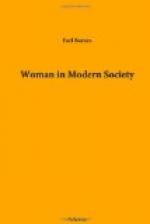This period, from fifty to seventy-five years, is now more shamefully wasted than any other of our national resources. If one attends a State federation of women’s clubs one will find nearly every delegate of this age. They are women of mature understanding and of ripe judgment, still possessing abundant health and strength, and where relieved by economic conditions from the necessity of manual work, they have to live such irregular and uncertain relations to life as can be maintained by mothers-in-law, grandmothers, club secretaries, and presidents of town improvement societies. Remove all restrictions on woman’s activity, and these strong matrons would vitalize our schools, give us decent municipal housekeeping, supervise the conditions under which girls and women work in shops and factories, and do much to clean up our politics. Debarred from direct power as they are, they are still making us decent in spite of ourselves.
For the future, then, it seems that we must accept working women in every path of life. We must remove all disabilities under which they labor, and at the same time protect them by special legislation as future wives and mothers. All girls must master some line of self-supporting work; and, except in the cases of those who have very special tastes and gifts, they should select work which can be interrupted, without too great loss, by some years of motherhood. During this time, the mother must be supported so that she can largely care for her own child, though she must also maintain outside interests through work, which will keep her in touch with the moving current of her time. Industries must be humanized and made fit for women. The last third of a woman’s life must be freed from legal limitations and popular prejudices, so that we may secure these best years of her life for private and public service. And meantime, it is well to remember that every step we take in making this a fit world for woman to work in, makes it a fit world for her father, her brothers, her lover and her husband to work beside her.
VII
The Meaning of Political Life
It is a well-known fact that when words have been long and vigorously used they gather within and around themselves varied meanings. Some parts of these meanings are remnants of historic, and possibly outworn, experience; other parts are the result of more or less deliberate perversion under the stress of deep feelings aroused by opposition and fighting. This is especially the fate of words in any way associated with politics. Think how battered and useless for purposes of ordinary discussion “democrat” and “republican” or “socialist” have become in America!
In the struggle of the last fifty years over woman’s suffrage, most of the words involved have undergone such transformations; and so many prejudices have become associated with them, that no one can think or speak clearly and fairly to-day in these terms. “Woman’s Rights,” “enfranchisement,” “Votes for Women,” “suffragette,” “polls,” “ballot,” “political issues,” and many other words, have gone through this destructive process.




